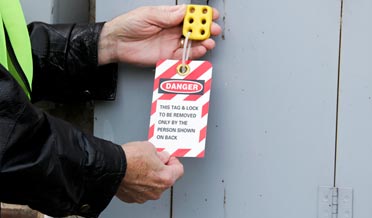Electrical Safety 101
14 Electrical Safety Tips You Need to Know
Always ready to pass on safety tips to friends, consider this an Electrical Safety 101 article.
Each year, about 400 people die from electrocution and another 400 from fires caused by electrical hazards. Electricity injures another 4,000 and electrical fires cause about $1.6 billion each year. A few basic understandings can help you develop ways to make sure to keep your home and family safer.
- Water is an excellent conductor of electricity. Since our bodies are 70% water, we are GREAT conductors of electricity, so best not to come into contact with it.
- Electricity is seeking ground-in most cases the ground, the earth. It will follow any conductor that leads to the earth; ANYTHING.
Here are 14 Electrical Safety tips to help you put these choice nuggets of information into practical use.
- Avoid mixing water and electricity. In 1971, when ground fault circuit interceptor (GFCI) outlets were required within 6’ of plumbing receptacles, the number of electrocution deaths in homes dropped by fifty percent. If electrical cords or hand-held appliances come into contact with water, go to the service panel and shut off the breaker—do not try to retrieve the cord or appliance while the current is still connected.
- Make sure to ground appliances and equipment properly. Change receptacles to three-prong outlets rather than using a two-prong adapter.
- Listen to your appliances. If an appliance repeatedly trips a circuit breaker, it is a cry for help, because something is wrong. Ignoring your appliances can lead to damage to the appliance or to your home. An electrician can help you determine the cause.
- Install GFCI outlets if needed. These life-saving devices interrupt the flow of electricity when it encounters water about 10 times faster than waiting for the circuit breaker to trip—almost instantaneously. If you own an older home, make sure to install these upgrades.
- Evaluate your service panel. Your service panel regulates the flow of electricity coming into your home and if you own an older home, the amount of electricity might be inadequate for your current need. That happens when you remodel or add major appliances; it certainly can happen when you add an electric vehicle charging station.
- Limit the use of extension cords and power strips. The goal should be to plug each appliance into a lone outlet and not overload any circuit. If you use power strips and surge protectors, understand their proper use.
- Be kind to your cords. Grasp the plug at the outlet, don’t pull the cord. Do not nail or staple cords down or let them be pinched under doors or furniture. Extension cords are inexpensive—replace damaged cords.
- Replace two-prong outlets. Most major appliances use three-prong plugs and the third prong provides an emergency “ground” in case of an emergency. If you own an older home with only two-prong outlets, an electrician can help you change your outlets to three-prong outlets.
- Avoid cube taps. The little boxes that convert a two-plug outlet into a four-plug outlet—called a cube tap—seem convenient but are not a good long-term solution for overloading an outlet. Truth is, the outlet is not equipped to handle that much current, and cube taps can lead to overheating a circuit.
- Replace missing or broken outlet covers. They protect fingers from coming in contact with wiring and are especially helpful in the dark.
- Protect children with outlet covers. Filling outlets with plastic, non-conductive plugs prevent children from inserting anything into the hole, resulting in shock or electrocution. Another option is child safety plates, with built-in, retractable covers that snap in place over the outlet when not in use.
- Use care with electrical power tools outdoors. Whether using construction tools, such as drills or saws, or outdoor lawn equipment, such as hedge trimmers or weed eaters, make sure to keep them dry. Do not use them during rain and use caution if the sprinkler comes on. Make sure that cords do not land in puddles—if they do, shut off the power at the circuit breaker before touching the cord or tool.
- Respect overhead power lines. Do not touch them or let tools that come in contact with power lines. Be careful to stay away from them with ladders and tool extensions.
- Know where water and electricity are in close proximity. That is kitchens, bathrooms, laundry rooms, and pools. Some of the appliances in these areas carry significant amounts of electricity, so use every safety feature available to make sure proximity does not lead to contact.
Would you like additional Electrical Safety tips?
Our four decades of experience as an Electrical Safety contractor AirPro Houston provides you with the skill and expertise to help with all electrical repairs for your home and business.
We have financing options available with great options with up to 72-month terms with approved credit. Call our teams of Commercial Electricians at 281-880-8805 and let us partner with you for all of your electrical repair and installation needs.

